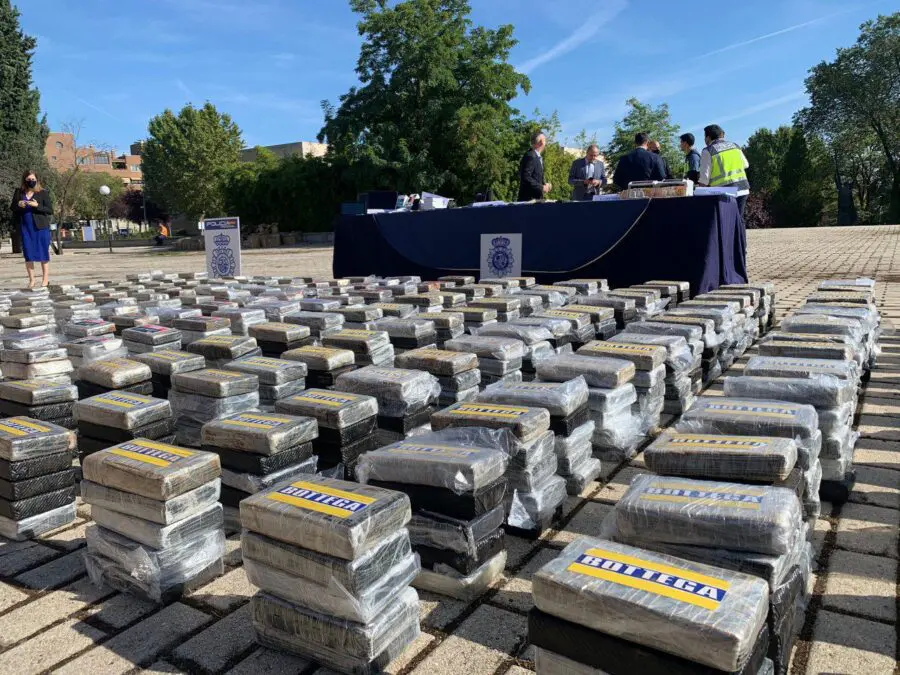Operation “Musala” has been carried out by the Spanish National Police together with the police authorities of Germany, Colombia, Croatia, Slovenia, and Serbia.
A total of 61 people have been arrested after a year of police investigations, and 4,010 kilograms of cocaine and more than 600,000 euros have been seized.
The operation has been a major challenge for EUROPOL due to the high mobility of the members of the Balkan cartel, requiring exhaustive and permanent coordination of all the police forces involved in the investigation.
In Spain, simultaneous operations have been carried out in the provinces of Barcelona, Madrid, Malaga, Tarragona, Gerona, and Valencia.
Agents of the National Police, in a joint operation with the police forces of Germany, Colombia, Croatia, Slovenia, and Serbia, have dismantled the largest cocaine distribution network in Europe, seizing 4,010 kilograms of this narcotic substance and arresting 61 people.
The operation was carried out under the coordination of EUROPOL and is the result of international cooperation between the different European police forces involved, as well as the Colombian and US authorities, with whom the investigation was launched jointly.
The dismantled organization intended to carry out a drug trafficking operation from South America to Europe. In this context, EUROPOL activated an exclusive operation to dismantle this criminal group, which led to the detection of the presence of several members of the Balkan cartel in different countries.
This criminal organization was mainly composed of nationals of Eastern European countries, mainly from Serbia, Croatia, and Montenegro. The main characteristic of the group under investigation was its significant economic muscle and lack of roots, which allowed all its members to settle in different countries of the world, to travel for meetings and gatherings, and to enjoy a standard of living available to few people.
These meetings were held in short periods of time, and it can be seen how they stayed in and frequented luxury hotels and restaurants. In Spain, the organization had houses and vehicles that the members of the group made available to the top leaders in order to make police work more difficult.
The aim of the police investigation was to try to attack the top of the criminal organization by covering all the meetings held in each country. Thanks to the work carried out in Colombia by DIPOL, it was even possible to see how they were linked to the world of football. Through the purchase and sale of certain players, the laundering of profits from drug trafficking was tracked.
GEO’s boarding of a sailing boat starts investigation
Police investigations began in 2018 when a sailing boat carrying two Croatian nationals and one American national was arrested. That vessel was boarded by the GEO, the Special Operations Group of the National Police, whose agents seized 1.4 tonnes of cocaine that was being transported inside it at the time.
Since then, investigations have indicated that the dismantled group was responsible for the shipment of the drugs and that they had the resources and means to continue attempting the operation, as was finally demonstrated. However, despite the numerous data collected, it was not possible at that time to prove the involvement of this group in the operation.
Nevertheless, the investigation continued and, at the end of 2019, one of the most important members of the organization was detected again in Spain to carry out the preparation of a new criminal enterprise.
In this way, the efforts were focused on a Montenegrin who represented a powerful criminal organization associated or the main organizations operating from the Eastern countries, specifically the Balkan cartel. This cartel constituted a real threat to the security of Eastern European countries and was considered by the European authorities to be one of the most important criminal organizations operating in Europe, characterized by paramilitary members and engaged in a multitude of illegal activities, mainly drug trafficking, house and car theft, money laundering, extortion, and kidnapping.
From that moment on, the work of all the countries focused on trying to confirm the people involved in the operation and, at the same time, to be able to track them. The Montenegrin group established its base of operations temporarily in Malaga, although it frequently traveled to the provinces of Madrid and Barcelona, without forgetting that it also traveled to Serbia, Hungary, and Slovenia, among other countries.
Through the movements of this group, it was possible to determine how they intended to introduce a large consignment of drugs into Europe via Spain from South America. This required infrastructure and logistics only suitable for large criminal organizations with high economic power.
The leaders were not involved in compromising activities.
The top of this organization was led by criminals who only participated in the negotiations without engaging in any compromising activities, often remaining outside the police investigations. As a result of the course of the investigation and the contacts and movements of the organization, it was deduced that they were preparing a major cocaine import.
The trips of the main targets took place in the previous months, visiting Madrid, Barcelona, and Malaga before traveling to South America in order to finalize the details of the operation.
Thus, in the middle of last year, they intended to transfer drugs from the Colombian coast to a boat, having everything ready and prepared to carry out the drug transaction. The action of the American authorities led to the seizure of 1,350 kilograms of cocaine. This police action was a serious blow to the organization, which was unaware of where the operation had gone wrong. During these months, it became known that the organization had links or connections in Italy, one of the countries where part of the drugs were presumably destined for.
After some time analyzing where they had failed, the organization decided at the end of 2020 to undertake a new maritime operation. This time they would transport an approximate quantity of 1,250 kilograms of cocaine, which would travel from the coasts of Brazil to Spain, specifically Catalonia, where they intended to introduce this significant quantity of drugs.
This is the reason why the organized group was once again reactivated and held new meetings in Europe – in Madrid in the case of Spain – all with the aim of being able to finalize the details of the operation. Following these meetings, in January of this year, the two main suspects traveled to the Dominican Republic.
The agents’ attention was drawn to the fact that, after this meeting in the Dominican Republic, the two people in charge of the operation began their tour around Europe again, once they had reached an agreement on the percentages and commissions. At that time, it was confirmed that one of them would travel to Dubai, where he met with the maximum investor and head of the organization.
After the worst of the pandemic, the organization takes up the operation again
As the months progressed, the pandemic temporarily delayed the organization’s plans, to the point that it was not until the end of December that the operation was established. At that point, they decided to try the maritime operation again, but this time the drugs would be taken to the Brazilian coast, from where they intended to travel to the rendezvous point and transfer the drugs. This meeting at sea took place at the end of January 2021, and the 1,250 kilograms that the group had ready and prepared were delivered.
Once the drugs were received in international waters, they were transported by sea to Europe, where the criminal group had all the necessary means to receive and, if necessary, distribute them. It was also detected how one of the main responsible parties traveled to Tarragona accompanied by third members of the organization to await the arrival of the shipment.
There, he met with an investor, who not only provided him with his local contacts to be able to provide the financing for the operation but also helped him to obtain the documentation to appear as a resident in Spain and make it easier for him to move around the interior of the peninsula.
In Spain, he began to sell the drugs on the European market even before he had access to them. It was for this reason that he contacted an organization that wanted to collect part of the drugs, at which point the members of the organization were arrested.
The ramifications of the organization not only extended to Catalonia, Malaga and Madrid, but they also had several organizations with which they collaborated on a regular basis. To do so, they made use of one of the members of this group, located in Valencia and mainly in charge of providing secure communications.
At the time of his arrest, and following a search of his home, more than 20 telephone terminals were seized with the aim of guaranteeing secure communications. This person had a second function within the dismantled group, as he was dedicated to receiving and sending money, and probably acted as treasurer. This was accredited by the surveillance and by what was found in the search of his home, where up to 15 banknotes of around five euros were found with annotations of dates associated with certain amounts, and whose function was to accredit that the holder had delivered or received the fixed or agreed amount.
Caught when the drugs were being delivered and received
When the group was caught, they were found to be in possession of various firearms and even a badge emblematic of a Montenegrin police force. The investigation was carried out when the heads of the organization were in Spain to manage the preparations for the final reception of the narcotic substance. By taking extreme security measures and avoiding attending meetings in person, the main organizers supervised all operations. However, they used other members of the organization to carry out the most compromising activities.
In this way, they were caught when the 1,250 kilograms of cocaine were being delivered and received on the outskirts of Tarragona, and several house searches were successively carried out in Tarragona, Barcelona, Girona, and Valencia, and all those involved and investigated were arrested. Likewise, the organization’s financing system was dismantled, which was the cultivation and international distribution of marijuana and the purchase and sale of high-end vehicles.
Through them, 12 members were arrested. Two of those arrested were considered priority targets by EUROPOL due to their criminal record, being investigated by many countries.
Connections with other criminal organisations active in Europe
The organization under investigation had strong connections with other criminal groups in Europe, among them the KAVAC Clan, which, among other tasks, was mainly responsible for financing the operations of this group through marijuana trafficking.
The Slovenian authorities (OPERATION CUBE) and in cooperation with Spain, Germany, the Netherlands, Croatia, and Serbia have simultaneously attacked this clan that operated in Eastern Europe and that was dedicated to any criminal act considered serious (drug trafficking of any kind, money laundering, arms trafficking, murders, etc…).
As a result of this close collaboration, 836 kilos of cocaine, 2,503 kilos of hashish, 12.5 kilos of heroin and 30 liters of amphetamine have also been seized in recent months, not to mention the arrest of 46 people as part of this organization.
The operation has culminated in the dismantling of one of the most active branches of the Balkan Cartel, attacking its logistical and financial apparatus, dismantling its leaders, and undermining its future operational capabilities.
Seized assets
In addition to the 61 arrests and the 4,010 kilograms of cocaine seized, the police operation has resulted in the seizure of 2,569 kilograms of marijuana, 173 kilograms of hashish, 12. 5 kilograms of heroin, 30 liters of amphetamine, and more than 6 million euros in cash, nine high-end vehicles, five motorbikes, a firearm, and 300 cartridges, a simulated weapon, a Montenegro police service identification badge, various bladed weapons, computer, and telecommunications equipment, camera detectors, frequency inhibitors and a multitude of documentation related to the organization’s companies.

Original article in Spanish HERE







